|
|
|
Sort Order |
|
|
|
Items / Page
|
|
|
|
|
|
|
| Srl | Item |
| 1 |
ID:
163711
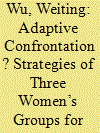

|
|
|
|
|
| Summary/Abstract |
An absence of overt contention has led scholars to question the existence of social movements in China and to agree with the “state corporatism” description of state–social group relations there. This article presents the idea of “adaptive confrontation” to demonstrate that there are women’s and lesbian groups in China that go beyond the idea of state corporatism, as well as to challenge current applications of social movement theories and better understand state–social group relationships in a repressive regime.
|
|
|
|
|
|
|
|
|
|
|
|
|
|
|
|
| 2 |
ID:
152003
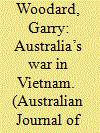

|
|
|
|
|
| Summary/Abstract |
Australia’s commitment in Vietnam can be interpreted as a small ally drawing its superpower partner into war for its own ends. Two studies by eminent Australian authors throw light on the role of human agency, and in so doing bring Australian historiography of the war closer to the trend in the United States. Peter Edwards’s history just about describes Vietnam as ‘Menzies War’. However, he finds no new sources on Menzies’s mindset, and diminishes the roles of his foreign ministers, Garfield Barwick and Paul Hasluck. The late Geoffrey Bolton’s intimate biography of Hasluck shows him as an active minister and also that his private papers are thin on Vietnam, the part of his distinguished career on which he never wrote. The Cabinet meeting of 17 December 1964 reveals much more about Australian decision-making on going to war than can be gleaned from Edwards’s cursory treatment and Bolton’s second-hand account. Barwick’s different approach, and even Hasluck’s last-minute caution, show Australia had a choice. Barwick, if he had remained Foreign Minister, might have kept Australia out of the Vietnam war, so freeing it to continue to play a leading regional political role.
|
|
|
|
|
|
|
|
|
|
|
|
|
|
|
|
| 3 |
ID:
148334
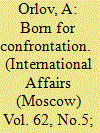

|
|
|
|
|
| Summary/Abstract |
IN RECENT YEARS, we have been watching a grandiose performance in the theater of the absurd, directed by the United States and its closest allies, that can be called Aggressive Russia Threatens the Peaceful and Respectable West. On July 8-9, 2016, the international public could watch another act of the farce, this time played in Warsaw at the NATO summit. Those present at the Polish gathering of the Atlanticists did not strain their intellectual abilities - they merely accused Russia of all conceivable and inconceivable sins and the gloomy state of international relations navigating probably the most hazardous period of its history since the Caribbean Crisis of 1962. While that crisis was more or less promptly resolved through a compromise achieved between the Soviet Union and the United States, today there is no light at the end of the tunnel of confrontation and it will hardly appear any time soon.
|
|
|
|
|
|
|
|
|
|
|
|
|
|
|
|
| 4 |
ID:
144960
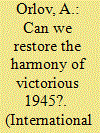

|
|
|
|
|
| Summary/Abstract |
THE 70TH ANNIVERSARY of the United Nations Organization is an international event of signal importance. Set up as a fundamental element of the international system, the UN remains its cornerstone with no alternatives no matter what its numerous critics are saying in chorus. Today amid the disarray and contradictions of the contemporary world, mankind, if confronted with the task of setting up a universal international structure to preserve peace and security, would have come up with an indifferent result if not a failure. Critics concentrate at individual aspects of the UN activity and talk about details: they stand too close to be aware of the grandiose panorama of this construction, hence their attention to arches and façades
|
|
|
|
|
|
|
|
|
|
|
|
|
|
|
|
| 5 |
ID:
152870


|
|
|
|
|
| Summary/Abstract |
The issue of terrorism has been a significant source of influence on the relationship between Iran and the U.S. since the Islamic Revolution. Iran's friendship with extremist groups that are designated as terrorist groups by the U.S. State Department is seriously challenging America's foreign policy. This article attempts to explore the prospect of confrontations on the issue of terrorism between Iran and the U.S. through a detailed analysis of their different interpretations and mutual recognitions of terrorism and through an in-depth analysis of the measures each party has taken regarding this confrontation. This article argues that the confrontation between Iran and the U.S. regarding the issue of terrorism is not strictly about terrorism. Rather, it is also about the conflicts of policies that result from different security interests and political values. Resolving the issue of terrorism depends on the reconciliation of the relationship between Iran and the U.S. Without mutual trust between the two nations, Iran will continue to support extremist groups in order to increase its influence against the external and internal pressures it is currently under, and the U.S. will continue to contain Iran's regional ambitions and seek changes in its behavior.
|
|
|
|
|
|
|
|
|
|
|
|
|
|
|
|
| 6 |
ID:
120558
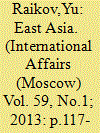

|
|
|
|
|
| Publication |
2013.
|
| Summary/Abstract |
THIS PAST SUMMER, the worsened territorial dispute in East Asia between Japan and China, Japan and the Republic of Korea, China and certain ASEAN members has appreciably soured the situation in the Asia-Pacific region. It reminded us of the fragility of peace in this exceptionally important region and placed this situation, together with the situation in the Middle East, at the top of the world's political agenda. The dispute involves three leading world nations on which peace in the international arena depends to a large extent. Located in the region are nations which are the first, second and third world economies (USA, China and Japan) with an enormous economic potential and great political influence on both the fortunes of the world economy and the situation in international relations on the whole.
|
|
|
|
|
|
|
|
|
|
|
|
|
|
|
|
| 7 |
ID:
155340
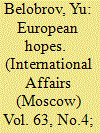

|
|
|
|
|
| Summary/Abstract |
THE REGIME for conventional arms control in Europe, established in the 1990s after the end of the Cold War, was for those years a unique set of measures and was seen as a model suitable for other parts of the world as well. However, destructive activities by NATO member countries over the past two decades have eroded it and threaten to ruin it completely if these activities are not stopped. The Treaty on Conventional Armed Forces in Europe (CFE), which was considered the cornerstone of this regime, is practically dead.
|
|
|
|
|
|
|
|
|
|
|
|
|
|
|
|
| 8 |
ID:
174514
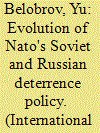

|
|
|
|
|
| Summary/Abstract |
IN 2019, the NATO countries celebrated the 70th anniversary of their military alliance with great fanfare. A common theme of the anniversary celebrations and NATO leaders' related public statements, as well as the London Declaration that the leaders of the NATO countries adopted at a meeting in London on December 3-4, 2019, is the idea that NATO is indispensable to maintaining security in the Euro-Atlantic region and the world as a whole, and that the policy of resolutely deterring Russia must continue. Even though the wording of the bloc's strategy has changed as the international situation and relations with the USSR/Russia change, that key element has remained a constant, fundamental principle of all seven strategic concepts and other basic documents of the alliance throughout its entire existence.
|
|
|
|
|
|
|
|
|
|
|
|
|
|
|
|
| 9 |
ID:
192517
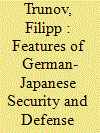

|
|
|
|
|
| Summary/Abstract |
Historically, both Germany and Japan have played significant roles in establishing a new world order. Today, the two countries are actively influencing the transformation of the "collective West" and its relations with the non-West. The role played in these processes by official Berlin, as well as by Tokyo, could considerably increase if they establish multi-channel and comprehensive security and defense cooperation. This paper seeks to explore the peculiarities and prospects of such cooperation in the early 2020s.
|
|
|
|
|
|
|
|
|
|
|
|
|
|
|
|
| 10 |
ID:
154939
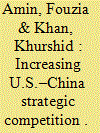

|
|
|
|
|
| Summary/Abstract |
Historically, China had been a great power and had maintained the largest economy
in the world for quite a long time. It would, therefore, like to regain its lost status.
There is consensus among many scholars that China would rise peacefully by
adopting the five “principles of peaceful co-existence”, thus, it would take a leading
role in the 21st century. It is viewed that the United States is already convinced to a
great extent that it might not be able to maintain sole dominance for too long in the
backdrop of the rising Chinese economic and military power. Based on an in-depth
analysis of the issue, the study concludes that China would avoid clashing with
Washington and its allies while protecting its economic interests across the globe.
Nevertheless, the Chinese would react if their core interests are threatened by the
United States and its allies including India. In order to protect its long-term interest
in the region and beyond, China would gradually develop its military including its
maritime capabilities to increase its influence beyond China’s periphery. However;
it is highly unlikely that in the near future, China would contest the United States
and its allies beyond the South China Sea. The study also concludes that in this
great ongoing game between the quadrangles of the countries, if India makes a
principle decision to stand by the United States in the case of a conflict with China
over the Indian Ocean, such a scenario would limit Pakistan’s options to either join
China or stay neutral. Either of the two options would pose a serious challenge for
Pakistan. A decision to stay outside the Great Powers’ power politics would be even
more difficult.
|
|
|
|
|
|
|
|
|
|
|
|
|
|
|
|
| 11 |
ID:
147085
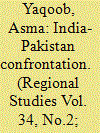

|
|
|
| 12 |
ID:
188505
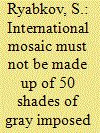

|
|
|
|
|
| Summary/Abstract |
Armen Oganesyan, Editor-in-Chief, International Affairs: Sergey Alekseyevich [Ryabkov], do you see in the near future a world split into two camps: the West vs. the non-West? It seems that world politics is moving toward a state of confrontation and a searching for partners for each center of power. In this regard, what model of international relations is Russia offering the world today?
|
|
|
|
|
|
|
|
|
|
|
|
|
|
|
|
| 13 |
ID:
138468
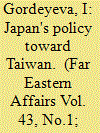

|
|
|
|
|
| Summary/Abstract |
The author offers an overview of complicated problems that stem, in one way or another, from Japan's policy toward Taiwan and have a direct bearing on relations between Japan and China. She puts these problems in the context of intensifying rivalry for predominance in the APR between the United States and Japan, on the one hand, and China, on the other, because Taiwan's reunification with mainland China would add significantly to China's overall strength, a prospect unpalatable to both Washington and Tokyo. Involved as it is, the situation is made worse by the dangerously escalating territorial dispute between Japan and China over the Senkaku (Diaoyudao) Islands which is closely related to the Taiwan problem.
|
|
|
|
|
|
|
|
|
|
|
|
|
|
|
|
| 14 |
ID:
148046
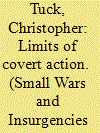

|
|
|
|
|
| Summary/Abstract |
This article evaluates the performance of the Special Air Service (SAS) during secret cross-border raids conducted as part of Britain’s undeclared war against Indonesia from 1963–1966. The analysis reviews the existing debate on the SAS’ performance during this campaign; it looks more closely at how military effectiveness might be defined; and it then examines, using the SAS’ own operations reports, the nature of their activities and their success or failure. This article concludes that critics of the SAS’ effectiveness during Confrontation are right; but for the wrong reasons. SAS operations did indeed have less effect than orthodox accounts would have it. But the reasons for this lay not in their misuse but in the exigencies of British strategy. This article demonstrates an enduring truth – no matter how ‘special’ a military force might be, tactical excellence cannot compensate reliably for problems in strategy.
|
|
|
|
|
|
|
|
|
|
|
|
|
|
|
|
| 15 |
ID:
158114
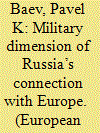

|
|
|
|
|
| Summary/Abstract |
The Russian challenge to the European security system is internal rather than external, because despite all the political efforts at distancing Russia from Europe, the indivisibility remains undiminished. The underlying assumption for Russia’s course is that the West is in irreversible decline, and the conclusion about the dissolution of the West-controlled world order is established in the key doctrinal documents. Instead of passively waiting for this meltdown to develop, it makes perfect sense for the Russian leadership to accelerate it pro-actively, using various levers, including military force. Moscow acts on the assumption that its “unconventional” methods could yield results only if augmented by military threats, against which the Europeans cannot master convincing counter-argument. The imperative to sustain and update credibility of these threats necessitates allocation of greater share of available resources to military build-up, which clashes with economic rationale of reducing this burden in the situation of protracted stagnation.
|
|
|
|
|
|
|
|
|
|
|
|
|
|
|
|
| 16 |
ID:
134139
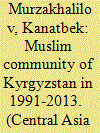

|
|
|
|
|
| Publication |
2014.
|
| Summary/Abstract |
The author analyzes the current state of affairs in the Muslim community of Kyrgyzstan and its relations with the state.
Emerging and developing amid never-ending conflict, the community has inevitably become relatively radicalized (the faithful are divided into jamaats) and, at times, destructive.
The author offers his own cures for the old and new problems of relations between the state and the Muslim community, the resolution of which is absolutely indispensable for their future development.
|
|
|
|
|
|
|
|
|
|
|
|
|
|
|
|
| 17 |
ID:
158171
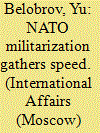

|
|
|
|
|
| Summary/Abstract |
AS THE MEMBERS of the alliance never tire of saying, the NATO countries are conducting the largest buildup of the bloc's collective military forces since the end of the Cold War. Along with the programmed increase in military expenditures, the expansion of the alliance's military potential, and the rise in the number of forward-based troops along Russia's borders on the territory of the East European countries, the scale of military activity is expanding, and facilities for the stockpiling of weapons, heavy vehicles, and other materiel are being created or brought up to NATO standards.
|
|
|
|
|
|
|
|
|
|
|
|
|
|
|
|
| 18 |
ID:
169526
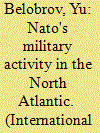

|
|
|
|
|
| Summary/Abstract |
THE ATLANTIC OCEAN, first and foremost its northern stretch, is what NATO considers its exclusive zone of vitally important interests. This idea is supported by the fact that it is the site of vital lines of communication and transport bridging North America and Europe, as well as strategically important military and civilian facilities, the protection of which is becoming one of the Alliance's key objectives amid what Western sources call an unprecedented increase in activity by the Russian Navy and Air Force in this subregion. What's more, the definition of the North Atlantic is being enlarged to include not only its strictly geographic area, but the entire water surface of the Baltic and Barents seas. These bodies are now considered a single theater of operations in the case of a military conflict with Russia.1
|
|
|
|
|
|
|
|
|
|
|
|
|
|
|
|
| 19 |
ID:
082147
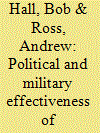

|
|
|
|
|
| Publication |
2008.
|
| Summary/Abstract |
Low-intensity conflicts such as counterinsurgencies tend to be characterized by a large number of contacts. The sheer number and often inconclusive nature of these incidents makes it difficult to determine whether military operations are effective. This article uses Confrontation as a case study, first building a database of incidents (including contacts) and then analysing the database statistically to identify patterns. This process shows that the British Commonwealth security forces succeeded in controlling the number of incidents and the space to force ratio. They also dominated the contact battle. The article helps to account for the British Commonwealth success at the operational and tactical level.
|
|
|
|
|
|
|
|
|
|
|
|
|
|
|
|
| 20 |
ID:
183432
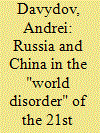

|
|
|
|
|
| Summary/Abstract |
This article analyzes the advisability of transforming the partnership relations between Russia and China into an alliance with an emphasis on the military aspect of their cooperation. The author considers points testifying to the inadvisability and irrationality of concluding such an alliance in the context of today's global situation, where a new world order has yet to form conclusively. With regard to the alliance between the Soviet Union and China of the 1950s and '60s, the author concludes that one of the factors leading to its breakup at that time was the Soviet leadership failing to understand items associated with the history of Chinese civilization that would allow the creation of a specific Chinese "psychotype." This eventually became the main reason for the incompatibility of the national mentalities in the Soviet Union and China, affecting the durability of the two countries' alliance in the middle of the 20th century. The author uses data from Chinese experts to emphasize the predominance in Chinese academic circles of the opinion that it is better to maintain a strategic partnership between the two countries, and there is no need to transform it into an alliance.
|
|
|
|
|
|
|
|
|
|
|
|
|
|
|
|
|
|
|
|
|